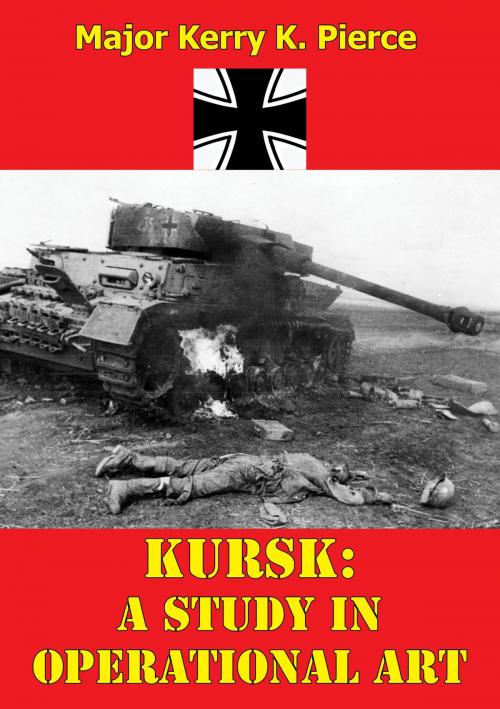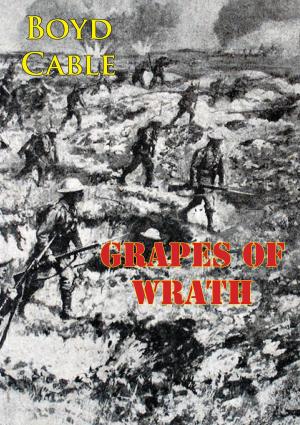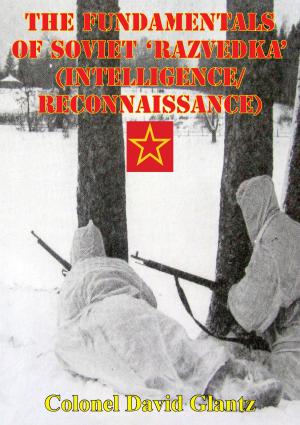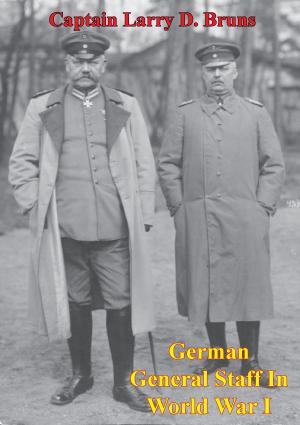Kursk: A Study In Operational Art
Nonfiction, History, Germany, European General, Military, United States| Author: | Major Kerry K. Pierce | ISBN: | 9781782895800 |
| Publisher: | Verdun Press | Publication: | August 15, 2014 |
| Imprint: | Verdun Press | Language: | English |
| Author: | Major Kerry K. Pierce |
| ISBN: | 9781782895800 |
| Publisher: | Verdun Press |
| Publication: | August 15, 2014 |
| Imprint: | Verdun Press |
| Language: | English |
This monograph examines the practice of operational art from the perspective of the Kursk Campaign of July-Oct., 1943. The study begins by presenting the German and Russian campaign plans as examples of two different methods of achieving a desired end state. Each plan’s vision of the future was heavily influenced by the nature of the strategic situation and the personalities of the two principal artists: Adolf Hitler and Marshal Georgii Zhukov. These two leaders had vastly different understandings of strategic possibilities, time-space dimensions of the battlefield, and the means required to achieve their desired end states. The success of Zhukov’s campaign plan was directly related to his linkage of appropriate means and methods toward a desired end state, while Hitler’s failure represented a failure to do likewise. The monograph also uses Kursk to examine several theoretical concepts of war. These include the relative strength of offense and defense, culminating points, the art of combinations, use of reserves, and the center of gravity.
The Russian decision to defend first against an expected German offensive is an excellent example of the use of operational art. Acting on the information of the LUCY espionage network, Zhukov constructed his campaign around an unprecedented tactical defensive system in an effort to destroy the German armored formations as they attacked toward Kursk. He intended to initiate his counteroffensive at the point where the German panzer corps had been so attrited that they would not be able to prevent a Russian onslaught which would expel all German forces from the Donetz Basin. German operational flexibility, which had been the hallmark of their previous campaigns, was eliminated by Hitler’s centrally devised and executed plan, reducing commanders such as Manstein and Model to mere tactical actors. In the end the Russian victory was a complete one: tactical, operational and strategic.
This monograph examines the practice of operational art from the perspective of the Kursk Campaign of July-Oct., 1943. The study begins by presenting the German and Russian campaign plans as examples of two different methods of achieving a desired end state. Each plan’s vision of the future was heavily influenced by the nature of the strategic situation and the personalities of the two principal artists: Adolf Hitler and Marshal Georgii Zhukov. These two leaders had vastly different understandings of strategic possibilities, time-space dimensions of the battlefield, and the means required to achieve their desired end states. The success of Zhukov’s campaign plan was directly related to his linkage of appropriate means and methods toward a desired end state, while Hitler’s failure represented a failure to do likewise. The monograph also uses Kursk to examine several theoretical concepts of war. These include the relative strength of offense and defense, culminating points, the art of combinations, use of reserves, and the center of gravity.
The Russian decision to defend first against an expected German offensive is an excellent example of the use of operational art. Acting on the information of the LUCY espionage network, Zhukov constructed his campaign around an unprecedented tactical defensive system in an effort to destroy the German armored formations as they attacked toward Kursk. He intended to initiate his counteroffensive at the point where the German panzer corps had been so attrited that they would not be able to prevent a Russian onslaught which would expel all German forces from the Donetz Basin. German operational flexibility, which had been the hallmark of their previous campaigns, was eliminated by Hitler’s centrally devised and executed plan, reducing commanders such as Manstein and Model to mere tactical actors. In the end the Russian victory was a complete one: tactical, operational and strategic.









![Cover of the book The Coldstream Guards, 1914-1918 Vol. I [Illustrated Edition] by Major Kerry K. Pierce](https://www.kuoky.com/images/2015/november/300x300/9781786250995-9rTG_300x.jpg)

![Cover of the book Condition Red; Destroyer Action In The South Pacific [Illustrated Edition] by Major Kerry K. Pierce](https://www.kuoky.com/images/2015/november/300x300/9781786252623-ExZ1_300x.jpg)
![Cover of the book Of Rice And Men [Illustrated Edition] by Major Kerry K. Pierce](https://www.kuoky.com/images/2015/november/300x300/9781786253255-tQ9N_300x.jpg)


![Cover of the book Flank Defense In Far-Reaching Operations [Illustrated Edition] by Major Kerry K. Pierce](https://www.kuoky.com/images/2015/november/300x300/9781786251473-8OWE_300x.jpg)